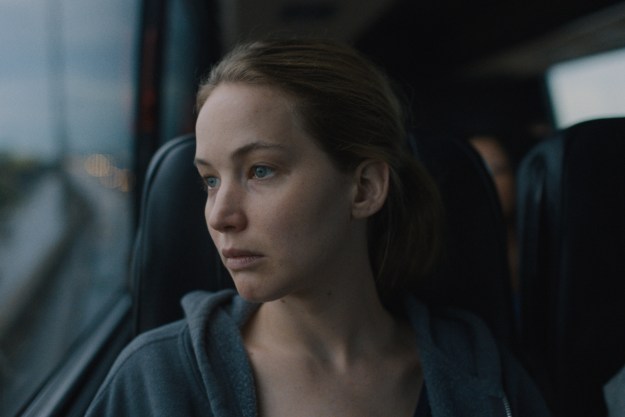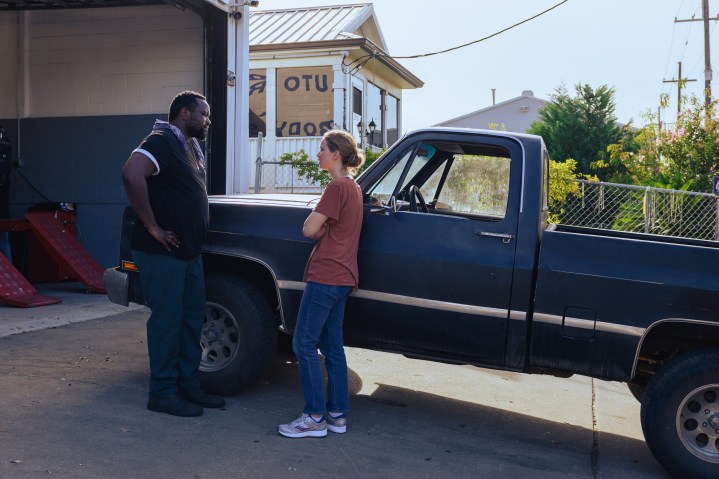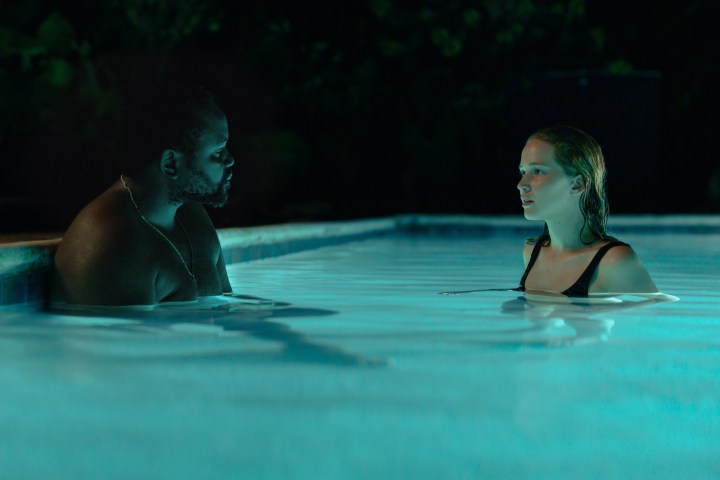
“Causeway is a modest, at times deeply moving drama that lets Jennifer Lawrence turn in a return-to-form lead performance.”
- Jennifer Lawrence's moving lead performance
- Brian Tyree Henry's scene-stealing supporting turn
- A haunting opening prologue
- A meandering, slow pace
- A by-the-numbers script
- A visual style that'd benefit from more invention
She wants to brush her teeth, but she can’t. That’s the image from Causeway’s haunting prologue that I haven’t been able to forget. It’s not the vacancy in Jennifer Lawrence’s eyes, nor the way she stays half-turned like a figure in a still painting for the entirety of the film’s static first shot. For me, it’s the way she reaches up to brush her teeth and misses, leaving behind only a smudge of toothpaste on her cheek, as well as the confused way she looks down at her hand afterward.
There’s a desire in the attempt, an intense desperation to try to return to life, and a sense of betrayal in Lawrence’s eyes when she misses the mark. The moments when Causeway returns to that current of desperate yearning are when it flows the strongest. In the wake of great trauma, it’s not, after all, just the lingering devastation that resonates, but also the trips and stumbles we often experience on the road to recovery.

Causeway introduces us to Lynsey (Lawrence), a military engineer, sometime after she was involved in a traumatic explosive attack in Afghanistan. The explosion caused Lynsey to suffer a severe brain injury that, when Causeway begins, has robbed her of most of her major motor skills. With the help of Sharon (Jayne Houdyshell), a kind nurse who takes Lynsey in, Lawrence’s injured veteran is slowly but surely able to start functioning again. Once she does, Lynsey is sent back to New Orleans and the very childhood home she joined the military to escape.
Being back under the same roof as her mother, Gloria (Linda Emond), only reinforces Lynsey’s desire to reenlist and, for lack of a better phrase, get the hell out of dodge. In an attempt to prove that she’s ready to “go back to work,” Lynsey takes a job cleaning pools around town and starts meeting with a neurologist (Stephen McKinley Henderson) who reacts skeptically to Lynsey’s request to fly back overseas. These actions, we’re led to believe, have less to do with Lynsey’s love for the military and more with her own desire to remain as far as possible from the life she had before she joined the armed services.
It’s only after she meets James (Brian Tyree Henry), an empathetic mechanic, that Lynsey begins to confront, whether willingly or not, her own lingering emotional trauma. The two strike up a quick friendship and it’s not long before Lynsey realizes that James is similarly struggling to come to terms with losses from his past, which seem to haunt him with literally every step he takes. Once the two begin to bond, Causeway joins the same talky, lonely subgenre as films like Columbus and Lost in Translation.

Causeway never quite achieves the same level of interiority or introspection as those films, though. While its New Orleans setting helps visually separate the film from so many other small-scale American dramas that hit theaters every year, Causeway never takes full advantage of its setting. Director Lila Neugebauer’s visual style is competent but largely uninventive, and at no point in Causeway does Neugebauer ever manage to visually juxtapose Lynsey against the urban sprawl of her city in a way that might evoke or reflect the character’s interior journey.
That means Causeway largely relies on Lawrence’s star performance to not only communicate her character’s thoughts, but also provide it with the kind of emotional heft that it might otherwise lack. Lawrence is, thankfully, up to the task, and her performance here is the best she’s given in years. Lynsey’s muted emotions call to mind Lawrence’s understated work in Debra Granik’s masterful 2010 drama Winter’s Bone, while her emotional isolation often feels like a more mature, organic expansion of the same loneliness that Lawrence brought to her Oscar-winning performance in Silver Linings Playbook.

It’s not ultimately Lawrence who makes the biggest impression in Causeway, though. That honor goes to Brian Tyree Henry, who has spent the past few years working toward becoming the best American actor of his generation. If his performance in Causeway doesn’t necessarily seal the deal in that regard, it certainly doesn’t mark a step backward, either. As James, Henry brings a relaxed, simmering intensity that not only makes him impossible to ever look away from, but also results in certain sideways glances and momentary pauses carrying more weight than they might initially seem to hold.
It’s in certain scenes between Henry and Lawrence that Causeway finds the necessary depth that many of its meandering stretches lack. Together, the two actors are able to bring to life the intense sadness shared by their characters in a way that never feels cheap, but deeply felt and real. That Causeway is able to achieve that kind of result through the work of its two stars is a testament to the power its best moments hold. The fact that the film is unable to achieve the overall depth that its story deserves is, conversely, a reminder that sometimes even the most modest of dramas would do well to be slightly more ambitious, both visually and narratively.
Causeway is playing in select theaters now. It premieres Friday, November 4 on Apple TV+.



